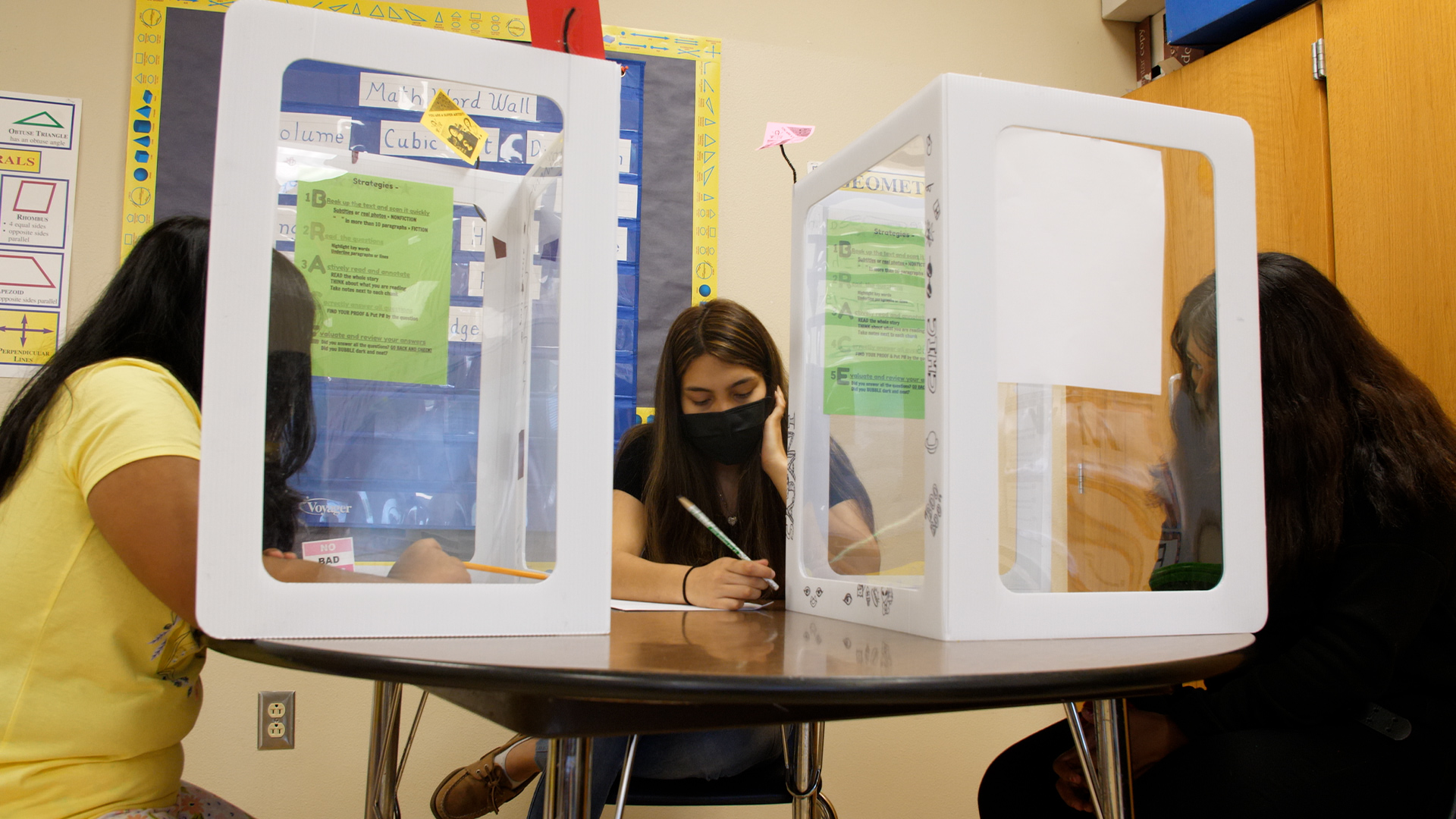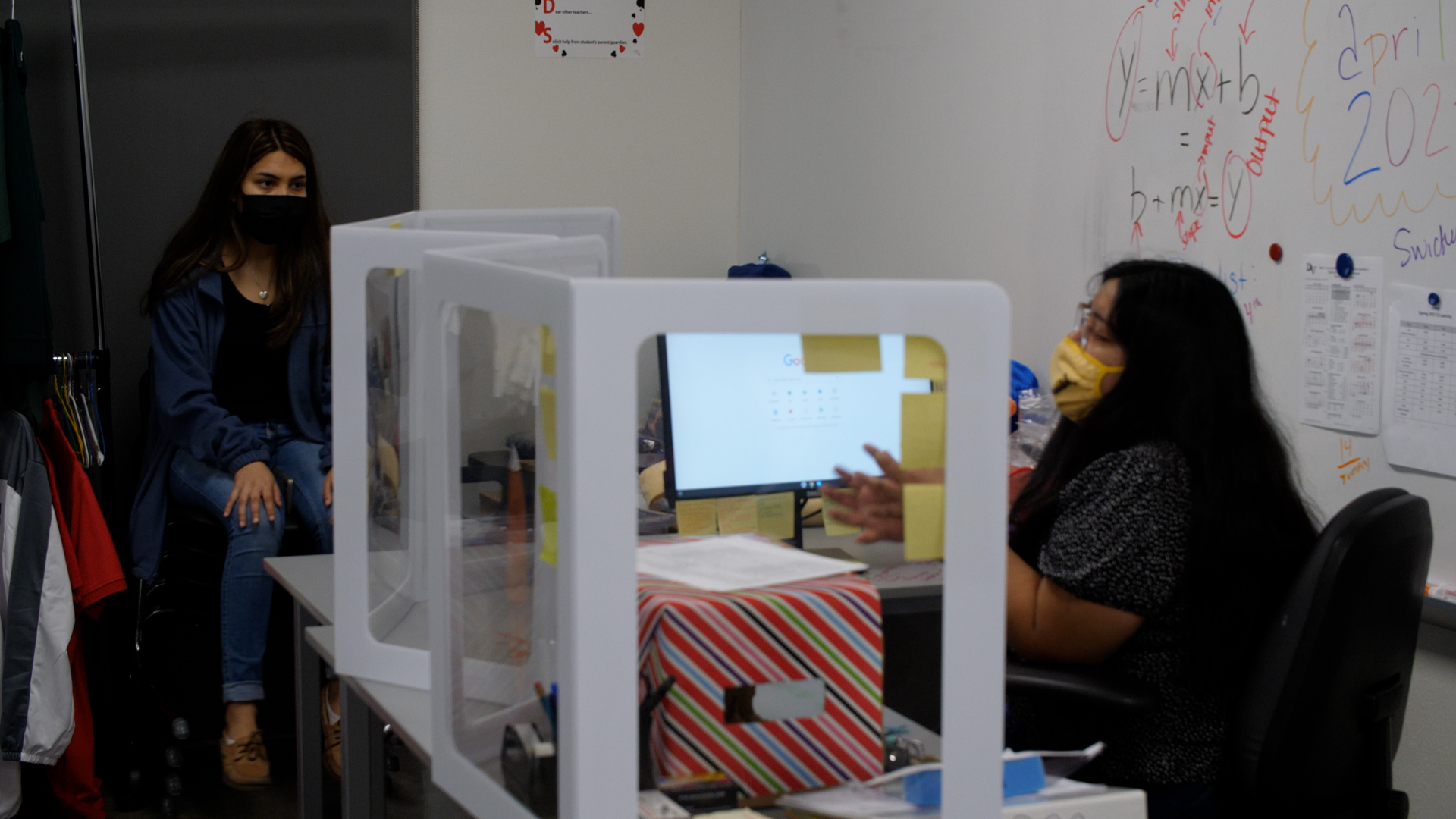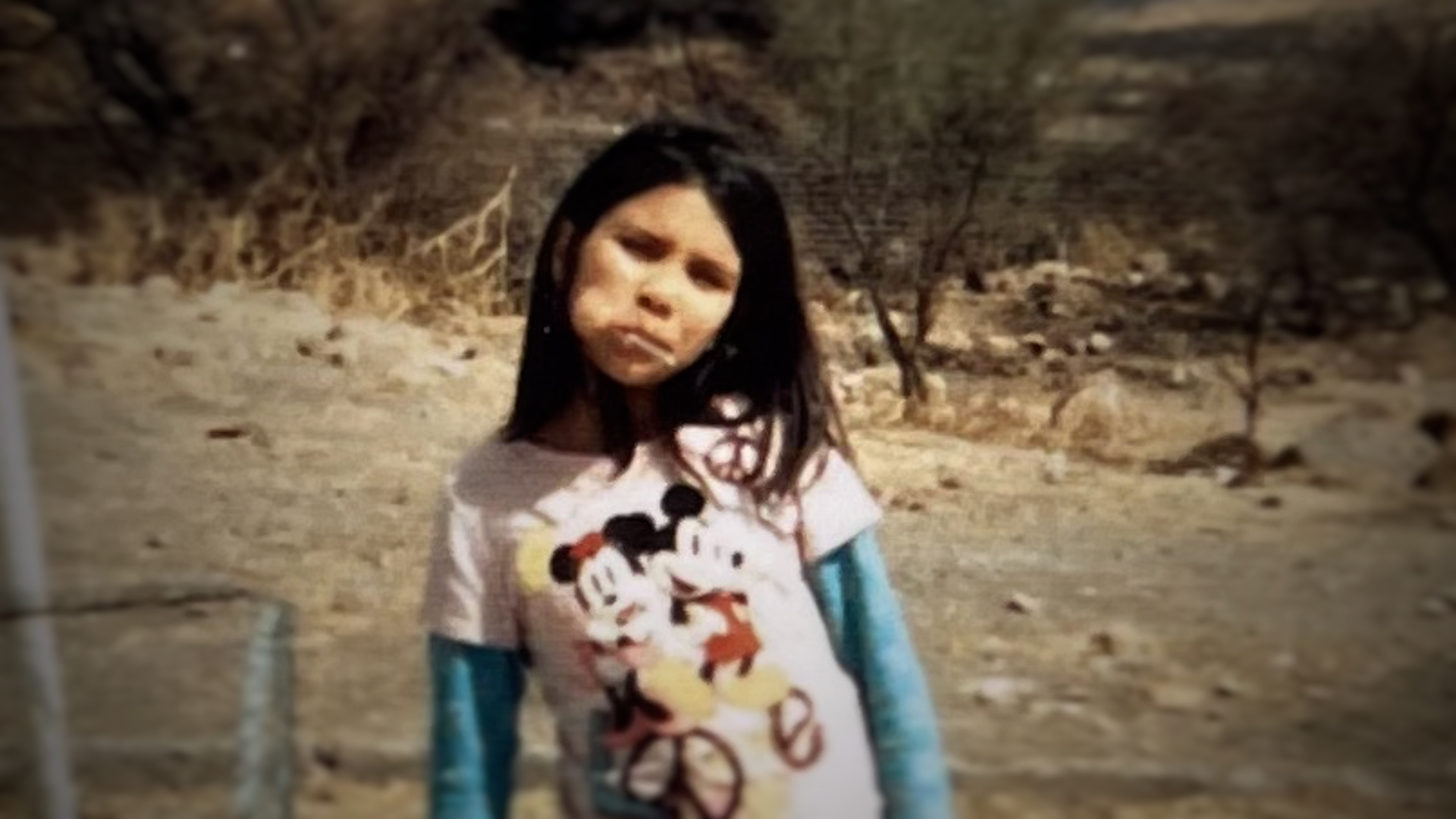Returning To Homeroom
Sitting outside her apartment on a blustery spring day, Sara Reza fires up her laptop and logs into Zoom. She says hello to the other attendees, a handful of fifth graders from Del Valle Elementary School.
“What are we working on today?” Reza asks, jumping into the math quizzes project to prep the students for the upcoming State of Texas Assessment of Academic Readiness, or STAAR, tests.
“It’s not an easy job,” Reza says. “Cause it’s hard to keep kids engaged with you when you’re over the computer.”
Reza isn’t a teacher, at least not yet. She’s a senior at Del Valle High School and will be one of the first to graduate from the school’s Teaching and Training Pathway. Part of the district’s Career and Technical Education arm, the program lets students earn college credit while getting classroom experience via internships at the district’s elementary and middle schools. Once they graduate, students over the age of 18 can apply for their Educational Aide I certificate, which allows them to start working as a substitute or teacher’s aide. By completing the program, students can effectively jumpstart their teaching careers by having both classroom experience and college credits under their belt.
Reza helps two fifth grade girls with their math homework. Reza plans to return to Del Valle ISD as a teacher once she graduates college.
“It’s just really, really exciting because I’m basically becoming a mini teacher,” Reza says. “I'm getting all the practice and everything so when I do become a real teacher, I'll be able to be an awesome teacher.”
Del Valle Independent School District offers over 20 CTE courses in subjects ranging from baking to biotechnology. But the education pathway is unique in that the goal isn’t just to send students out into the working world; it’s to have them return to Del Valle ISD. They’re not alone in their need to attract a pool of potential educators. Texas has a high rate of teacher turnover, with roughly 1 in 3 quitting before they reach their sixth year in the classroom. Districts are looking for new ways to recruit staff.
Tashara Angelle is the CTE coordinator at Del Valle ISD. She says the district is planning to hire students as teacher’s aides and substitutes and guarantee them student teaching positions as incentives to stay on with the district once they graduate college.
“They don't have to come back and teach here, but we're making it easy for them to do that,” she says.
Angelle says having students return to teach at their alma maters benefits more than just the school.
“They have parents who still live in the district, they have little brothers and sisters, and so they have strong ties to the community,” Angelle says. “Which will help, I think, for teacher retention ... so not only is it beneficial for the students, it's beneficial for the community as a whole.”
Reza gets feedback on her internship from Favela Soto. Reza says the stereotype that Del Valle is “a ghetto school” is inaccurate, pointing to the many certificate and dual credit programs offered. “They haven't seen the amount of stuff we have in Del Valle,” Reza says.
Angelle is proof positive of that concept. She graduated from Del Valle before returning as a teacher and coach. She says her understanding of the community and its needs reduced disciplinary action and boosted student retention.
“I didn't have nearly as many discipline problems because they would be like, ‘Oh, you kind of sound like my mom,’” Angelle says. “Obviously it's a huge benefit for the students because they do feel, like, OK, this teacher knows me, this teacher may know my family … I can identify with this person.”
Improving disciplinary outcomes is an issue nationwide. Data from the U.S. Department of Education’s Office of Civil Rights Data Collection show students of color and students with disabilities are disproportionately suspended and expelled compared with their white and nondisabled peers. Other studies have shown suspensions by and large are over minor offences. Added together, this means more students of color are being pushed out of school.
Muhammad Khalifa is a professor of Educational Administration with The Ohio State University, and president of the Culturally Responsive School Leadership Institute. He says having culturally competent teachers and leaders could improve those statistics.
“One of the reasons that you find inequities in education is because minority students … are not able to connect with schools,” Khalifa says. “Until students can see themselves and what they're learning ... then schools will not be culturally responsive.”
Khalifa points to successful programs like the Office of Black Student Achievement in the Minneapolis Public School system and the Center for Black Educator Development in Philadelphia as templates for culturally responsive curriculum. The Minneapolis school system saw attendance and GPAs rise for students in the program over a two year period.
“Education needs to mirror, and it needs to speak to, and it needs to honor, and it needs to embrace, and it needs to lift up the students that the education is intended for,” Khalifa says. “It's really that simple.”
For Reza, having teachers who understood her unique challenges changed the way she thought about school. An English language learner, Reza would get frustrated trying to keep up with lessons while picking up a new language simultaneously. She would pretend to be sick so she wouldn’t have to go to class. But teachers through elementary school took time to make sure she grasped both the lessons and the language.
A photo of Reza from elementary school. Reza didn’t enjoy school when she was younger. “It took a while for me to process things … since I was still kind of learning English,” Reza says. She plans to specialize in bilingual education. Photo courtesy Sara Reza.
“Just like seeing them put in the amount of work and effort to help me … it's just always motivated me to become a teacher,” Reza says.
Reza says she wants to give back to the district that helped her get started on her path to becoming an educator. She knows the impact it has on students to hear that she too attended this school.
“I think it paints a very powerful picture to them, to the kids, about Del Valle,” Reza says. “They’re more excited to take their career classes and decide what they want to be.”
As for Reza, she knows exactly what she wants to be. More than a teacher, she wants to be an inspiration for her future students.
“I want to be that teacher that the elementary kids think on in high school,” Reza says. “Like, ‘Oh yeah. I had that one teacher. She helped me so much. I still think of her.’”
Correction: Students who complete the Teaching and Training Pathway at Del Valle ISD are eligible for an Educational Aide I certification. In a previous version it was referred to as a teaching certificate.
Community journalism doesn’t happen without community support.
Got story ideas, advice on how we can improve our reporting or just want to know more about what we do? Reach out to us at news@klru.org.
And if you value this type of reporting, then please consider making a donation to Austin PBS. Your gift makes the quality journalism done by the Decibel team possible. Thank you for your contribution.
More in Education:
See all Education posts








Contact Us
Email us at news@klru.org